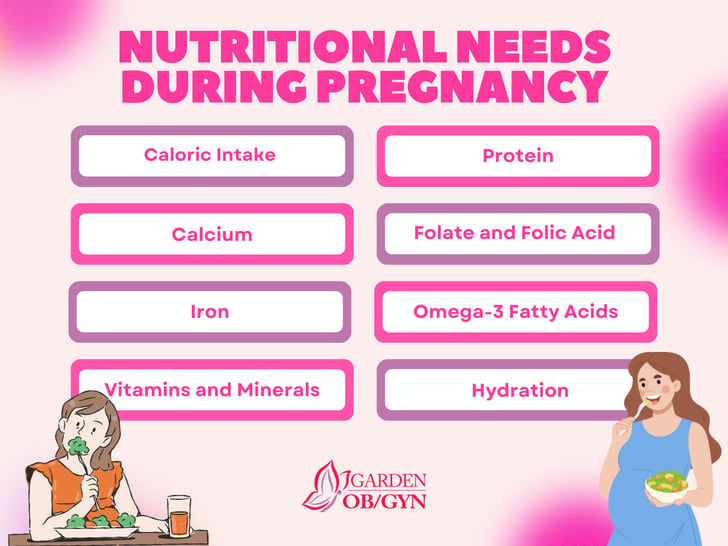Nutritional Needs During Pregnancy
Meeting the nutritional needs during pregnancy is crucial for a healthy pregnancy, proper fetal growth, and the overall well-being of both mother and child.

Pregnancy is a transformative and exciting time in a woman's life, marked by the development of a new life within her. During this period, optimal nutrition becomes paramount, as it directly influences the health and well-being of both the mother and the developing fetus. Meeting the nutritional needs during pregnancy is crucial for a healthy pregnancy, proper fetal growth, and the overall well-being of both mother and child.
- Caloric Intake:
The energy requirements during pregnancy increase to support the growing fetus and the changes in the mother's body. While individual needs may vary, an average increase of 300-500 calories per day is recommended. These additional calories should come from nutrient-dense foods to ensure a balanced diet.
- Protein:
Protein is essential for the development of the baby's organs, muscles, and tissues. Pregnant women should aim for an extra 25 grams of protein daily. Good sources of protein include lean meats, poultry, fish, eggs, dairy products, legumes, and nuts.
- Calcium:
Calcium is crucial for the development of the baby's bones and teeth. Pregnant women need approximately 1,000 milligrams of calcium daily. Dairy products, leafy green vegetables, fortified cereals, and certain fish are excellent sources of calcium.
- Folate and Folic Acid:
Folate, a B-vitamin, is vital for the early development of the baby's neural tube, which eventually becomes the brain and spinal cord. Adequate intake of folate helps prevent neural tube defects. Women of childbearing age and those who are pregnant should consume 600 micrograms of dietary folate equivalents daily. Folate-rich foods include leafy greens, citrus fruits, beans, and fortified cereals. In some cases, a supplement containing folic acid may be recommended.
- Iron:
Iron is essential for the formation of red blood cells and the prevention of anemia, which is common during pregnancy. Pregnant women need around 27 milligrams of iron per day. Good sources of iron include lean meats, poultry, fish, fortified cereals, and legumes. Consuming vitamin C-rich foods alongside iron-rich foods enhances iron absorption.
- Omega-3 Fatty Acids:
Omega-3 fatty acids, particularly DHA (docosahexaenoic acid), play a crucial role in the development of the baby's brain and eyes. Pregnant women are advised to consume fatty fish like salmon, walnuts, flaxseeds, and chia seeds to meet their omega-3 fatty acid needs. If necessary, supplements may be recommended under healthcare provider guidance.
- Vitamins and Minerals:
A well-rounded diet should provide an array of vitamins and minerals, including vitamin D, vitamin A, vitamin C, and zinc. These nutrients contribute to the overall health of both the mother and the developing baby.
- Hydration:
Adequate hydration is essential during pregnancy to support the increased blood volume, amniotic fluid, and overall bodily functions. Pregnant women should aim to drink plenty of water throughout the day.
Meeting the nutritional needs during pregnancy is vital for a healthy and successful pregnancy outcome. A well-balanced and varied diet, along with appropriate supplementation when necessary, ensures that both the mother and baby receive the essential nutrients required for optimal growth and development. Consulting with a healthcare provider or a registered dietitian can help tailor nutritional recommendations to individual needs and circumstances, promoting a healthy pregnancy journey.
































